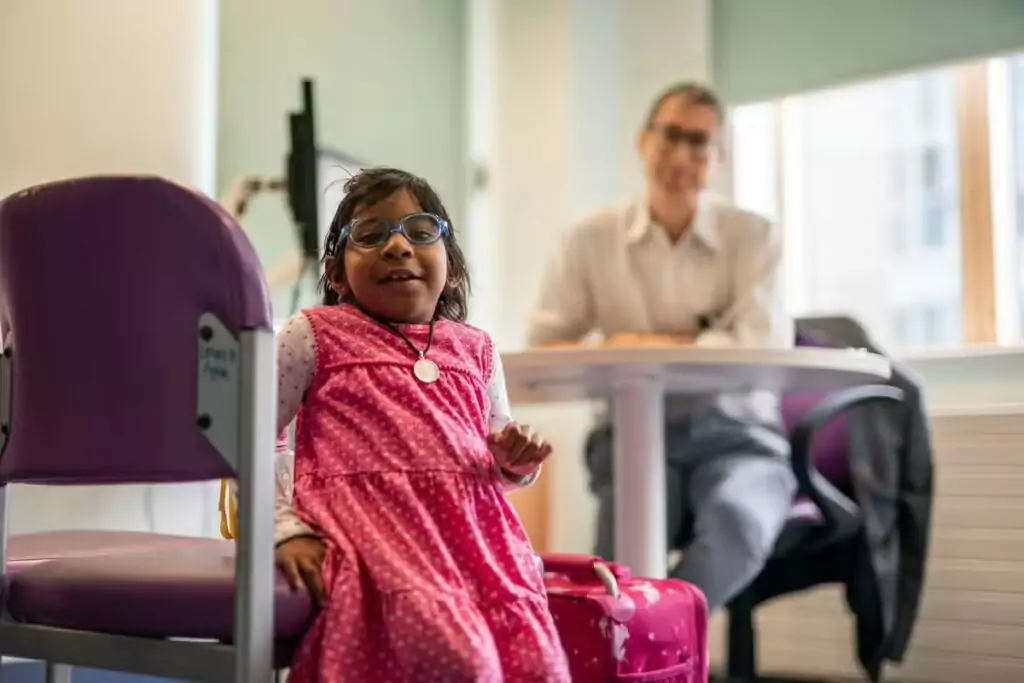In a medical breakthrough, eight-year-old Aditi Shankar has become the pioneering child in the UK to receive a unique kidney transplant, BBC News reports. This innovative procedure ensures she doesn’t need lifelong drugs to ward off organ rejection.

✅ AI Essay Writer ✅ AI Detector ✅ Plagchecker ✅ Paraphraser
✅ Summarizer ✅ Citation Generator
The trailblazing surgery took place at the renowned Great Ormond Street Hospital, where physicians reconfigured Aditi’s immune response prior to the kidney implant. They achieved this transformation by utilizing bone-marrow stem cells from the organ donor, Aditi’s mother. Consequently, Aditi’s body now recognizes the new kidney as its own.

A few weeks subsequent to the surgery, the hospital ceased Aditi’s immunosuppression regimen. This significant step eliminated potential long-term repercussions from these potent drugs which, conventionally, are ingested daily to forestall organ rejection.
Aditi, a sufferer of the infrequent genetic disorder, Schimke’s immuno-osseous dysplasia (SIOD), which compromised her immune defenses and jeopardized her kidney function, is now back in school. Both her immune system and new kidney are functioning seamlessly.
The unique transplant technique was first introduced to Great Ormond Street Hospital specialists through international interactions, as it had been previously employed on children with SIOD abroad. Aditi’s journey began with a bone-marrow transplant, infused with stem cells from her mother, Divya, aimed at rejuvenating her immune mechanism. Six months onward, she received the kidney, also from her mother.
Reflecting on her contribution, Divya expressed her profound pride to PA Media press agency,
“I was so elated to provide her with blood cells and a kidney.”
Aditi reminisced about her “special sleep” during surgery, and is now rejoicing in her recovery. “I can now indulge in swimming,” she cheerfully added.
Prof. Stephen Marks, an expert pediatric kidney specialist at GOSH, confirmed the success of Aditi’s treatment, asserting that she’s the first UK kidney transplant recipient exempted from post-surgical immunosuppressive drugs. He highlighted her thriving life, stating,
“She’s now an energetic eight-year-old, attending school, and relishing a stellar quality of life.”
Nevertheless, this dual transplant method might not be widely adopted due to elevated patient risks. Prof. Jeremy Hughes, Kidney Research UK’s chair of trustees, elucidated that any fresh remedy invariably entails risks. In this instance, stem-cell transplantation necessitates the patient undergoing both chemotherapy and radiotherapy. But he also accentuated the groundbreaking nature of this treatment.
The method heralds a future where the complications of transplantation, primarily caused by the body’s immune system recognizing the transplant as a foreign entity and attacking it, can be mitigated, eliminating the need for immunosuppressive drugs and their associated complications.
Discussing Medical Advancements
In light of the recent medical advancement where a young girl, Aditi Shankar, underwent a groundbreaking kidney transplant that eliminated the need for lifelong anti-rejection drugs, we find ourselves on the precipice of a new era in medical science. This intriguing case paves the way for a myriad of discussions, considerations, and examinations, revolving around the evolution and ethical implications of such medical procedures, the role of stem cells in revolutionary treatments, and the global impact of shared medical knowledge and innovation.
The ensuing subjects and contemplations do not only ponder the scientific dimensions but also extend to the psychological, social, and economic facets of pioneering medical interventions. In the subsequent discourse, proposed essay topics will serve as a beacon, guiding us through the intricate maze of medical advancements, their application, and their potential to reshape our perspective on healthcare and medical treatments, much like Aditi’s remarkable journey has already begun to do.
| S. No. | Essay Topics |
|---|---|
| 1 | The Evolution of Organ Transplants: From Traditional Methods to Immune Reprogramming. |
| 2 | The Role of Stem Cells in Medical Breakthroughs: A Deep Dive into Aditi Shankar’s Case. |
| 3 | The Ethical Implications of Advanced Medical Procedures: Balancing Innovation and Risk. |
| 4 | Medical Advancements in Pediatric Care: How Children Like Aditi are Benefiting from New Transplant Techniques. |
| 5 | The Pros and Cons of Immunosuppression: A Comparative Analysis of Traditional Transplants and the New Rejection-Free Method. |
| 6 | Stem Cell Research: The Future of Organ Transplants and Beyond. |
| 7 | Schimke’s Immuno-Osseous Dysplasia (SIOD): An Exploration of Rare Genetic Disorders and the Medical Challenges They Present. |
| 8 | The Psychological Impact of Pioneering Medical Treatments: Patient and Family Perspectives. |
| 9 | The Global Collaboration in Medicine: How International Colleague Discussions Lead to Breakthroughs in Treatment. |
| 10 | Challenges and Potential: The Limitations and Future Scope of Rejection-Free Organ Transplants. |
| 11 | The Balance of Treatment: Evaluating the Trade-offs Between Chemotherapy, Radiotherapy, and Immunosuppression. |
| 12 | Patient-Centric Medical Advancements: How Tailored Treatments, like Aditi’s, are Changing the Face of Modern Medicine. |
| 13 | The Role of Family in Medical Treatments: Analyzing the Emotional and Medical Impact of Donations from Family Members. |
| 14 | Financial and Social Implications: How Cutting-edge Medical Advancements Could Impact Healthcare Economics and Social Equity. |
| 15 | Medical Training for the Future: Preparing Healthcare Professionals for Rapidly Advancing Treatment Techniques. |
Follow us on Reddit for more insights and updates.





Comments (0)
Welcome to A*Help comments!
We’re all about debate and discussion at A*Help.
We value the diverse opinions of users, so you may find points of view that you don’t agree with. And that’s cool. However, there are certain things we’re not OK with: attempts to manipulate our data in any way, for example, or the posting of discriminative, offensive, hateful, or disparaging material.